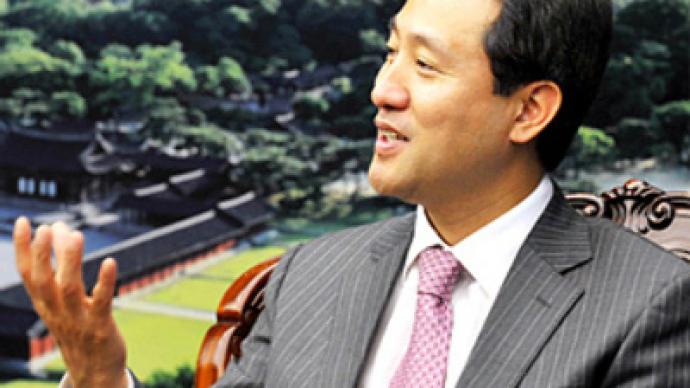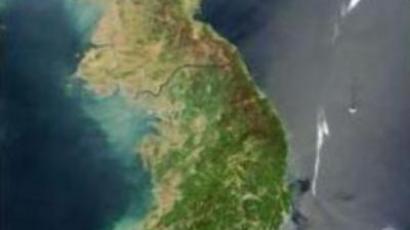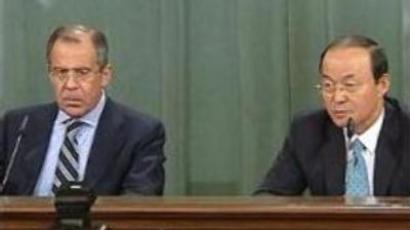Plenty of Seoul: Korean mayor upbeat, despite economy

Seoul mayor Oh Se-hoon spoke with RT on the impact of the global economic crisis and his plans to develop the Korean capital into a world-class destination.
RT: As the mayor of Seoul what would you consider your major achievements or changes in the life of the city?
Oh Se-hoon: Since I became the mayor of Seoul I have stressed the importance of taking a creative approach. City officials try to think as regular residents and propose new interesting ideas in order to make living standards higher. You can compare that to the system used by Japan’s Toyota.
I have implemented a new HR system in order to motivate employees. Those who work hard are rewarded, and those who slack are punished. This way we are able to maintain a constructive competition among city workers. They also favor this system, because it stimulates their skill and integrity. In the end, residents of Seoul receive the benefits and they are happy with the administration. Our major achievements are the Administration Call Center, River Han revival project, construction of Gwanhvamun Square, and providing long-term rental housing.
RT: Seoul is one of the most populated cities in the world. Do you think you should welcome all visitors or limit the number of foreigners who come here?
Oh Se-hoon: Seoul is trying to be a global city, attractive for foreigners who want to visit, live and invest here. In order to become this kind of city we need to overcome the language barrier, first of all, to be more open to foreigners. We are working on creating a Global Zone in Seoul in order to achieve that, and planning to open a Global Center. We also plan to establish two more international schools (we already have 21 of them in Seoul). We are trying to attract foreign investors and rental housing developers by offering certain benefits, including tax cuts.
All big cities with population over 3 million naturally have their own problems. In order to solve these problems and provide a high standard of living we need to be competitive. The main factor here is the attractiveness of a city, as the American researcher Joseph S. Nye J put it. That is why 2008 was the Culturenomics year. The main idea was to strengthen our cultural potential, to turn Seoul into an attractive city where people would want to live and do business. I think that this will raise the standard of living for Seoul’s residents.
RT: Was Seoul prepared for the global financial crisis? How did it influence the city economy and business?
Oh Se-hoon: The financial crisis that started in the USA is now influencing the economies of all other countries, unfortunately Seoul is no exception. I think that in the near future a new financial center will emerge in a country that handles the current situation the best.
Our country has a lot of experience in this area after overcoming the 1997 crisis. After that crisis, for 10 years we had been trying to improve our financial system. Historically Koreans have always been able to use a crisis to grow. I am sure that this time we will also be able to get out of the crisis in the near future.
We have a strong economy, stable dollar fund, good education system and highly professional work force. With all that we can overcome the crisis.
But I think we can’t use only market tools in order to overcome the crisis. We need to take measures on the state level, and Seoul’s administration has also taken measures to speed up the process.
We plan to allocate 1,200 bln won in financial aid to smaller business to save them from bankruptcy due to expensive dollar and money deficiencies. We also plan to start some infrastructure construction projects earlier than planned in order to keep up the level of private investment.
We have taken different measures in order to help our residents with lower incomes. In 2009 we will allocate 3,727.4 billion wons to help the elderly, children, poor people and people with disabilities. This is 27% of the budget, so we raised the budget by 72% compared to last year. We also have a budget of 198.2 bln wons to help boost the economy, 135.3 bln wons to help create jobs, and 62.9 wons to help smaller businesses. We are ready to do everything we can to support our people.
RT: What measure has Seoul’s city administration taken to help underprivileged residents?
Oh Se-hoon: Seoul’s administration does everything it can so that underprivileged residents – the poor, homeless, people with disabilities – can be independent. The budget for this is 3100 bln wons in 2008, which is 16.6% of the total budget.
We conduct special long-term savings projects that will allow us to stop doing the one-time financial aid for the underprivileged. With the help of these projects, we will also solve the problem of inherited poverty.
We also have different programs for the homeless in order to get them off the streets and engage in normal social lives. We conduct special seminars in order to motivate them. We plan to increase the number of seminar participants.
RT: You are an active supporter of using the canal water. Is canal water in Seoul really clean?
Oh Se-hoon: Canal water in Seoul is really clean and safe, I often use it.
This water undergoes serious testing. According to NSF (National Sanitation Foundation), the water here is very safe and clean, does not contain hormones, poisonous chemicals, viruses, bacteria, and all thanks to Seoul-Water Now System, which works 24-7. According to our country standards, water should be 0.5 NTU, whereas in the Arisu canal it is lower than 0.1 NTU.
The Seoul city administration inspects canal water for free and provides financial aid to Seoul’s residents for water pipe repairs.
RT: Tell us a little bit about the projects related to the rivers in the center of Seoul.
Oh Se-hoon: We have successfully revived the Chongechon River and now we have an even higher criteria for such projects. The city administration is planning to revive 17 rivers in Seoul in order to improve the standard of living as well as the city landscape. The budget for this is 327.6 bln wons.
RT: Every capital in the world has its own symbol. For example, the Eiffel Tower in Paris, Coliseum in Rome, Big Ben in London. Tell us a little bit about the Han River Revival project…
Oh Se-hoon: The essence of this project is that it is a solution for different problems and making sure the Han river plays a key role in future development of Seoul. The Han River Revival project will go on until 2030. The first stage is to revive the nature of the river and make it accessible. We will build a park, plant trees along the banks, construct a road leading to it, improve the lighting along the bridges, build a large fountain by the Banpho Bridge, create an artificial island, and create 4 theme parks. All these projects will be completed by the end of next year.
We also have a plan to build a river way leading to the Yellow Sea so that Seoul could become a port, conducting trade with China and other Asian countries.
RT: Two of the former Seoul’s mayors have become presidents – Yoon Boson and Lee Menback. Do you plan to run for office?
Oh Se-hoon: Believe it or not, right now I am happy to be doing the mayor’s job. I think it is a great sense of satisfaction when you achieve something. I do not really have political ambitions. Our current projects are really important to me at the moment. We are moving in the right direction, our projects already bring positive results. The reform is working. I think there is a need for me to be the leader at the moment. It is too early to speak about my next steps in politics. Right now my responsibility is to strengthen the current reforms.














